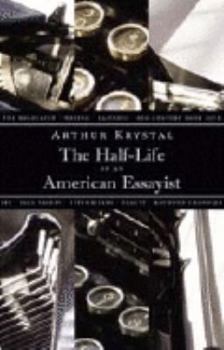The Half-Life of an American Essayist
"A vigorous case for the virtues of old-fashioned literary criticism."--New York Times Book Review
In his first book, Agitations: Essays on Life and Literature, which was heralded by such diverse critics as Jacques Barzun and Morris Dickstein, Arthur Krystal demonstrated that the literary essay is alive and well. Conversational in tone, but capable of addressing the political and semiotic methods adopted by the academy, Krystal's clear and allusive style constituted a reprimand to the fashionable idea that literature is the theorists' domain. His new book, The Half-Life of an American Essayist, continues to demonstrate that the literary essay in the right hands can itself be a subset of literature. Whether he's examining the evolution of the typewriter, the nature of sin, the cultural implications of physiognomy, the works of Paul Valery and Raymond Chandler, or his own ineffable laziness, Krystal's buoyant prose always speaks to the common reader. The twelve essays in Half-Life--the title is from Goethe's "Experience is only half of experience"--go deeper than the standard book piece; they hew to the line first drawn by Montaigne and later extended by Dr. Johnson, Hazlitt, Woolf, and Orwell. Although there may be no preordained way of writing about literature, Krystal takes his cue from Edwin Denby, who maintained that the first duty of the critic is to be "interesting." No matter how large the subject--whether it is the history of boxing or the growth of the Holocaust industry, Krystal paints broad subjects with precise brushstrokes. Erudite, lettristic, and informative, his essays are still accessible to the general reader. The reason is simple: as Dr. Johnson noted, "What is written without effort is in general read without pleasure." To this one might add that there is satisfaction to be had in the effort itself. How else could one write as committedly and entertainingly about Paul Valery's Cahiers as about Joe Louis's left jab?Format:Hardcover
Language:English
ISBN:1567923283
ISBN13:9781567923285
Release Date:March 2007
Publisher:David R. Godine Publisher
Length:182 Pages
Weight:0.85 lbs.
Dimensions:0.9" x 5.5" x 8.5"
Customer Reviews
0 rating





